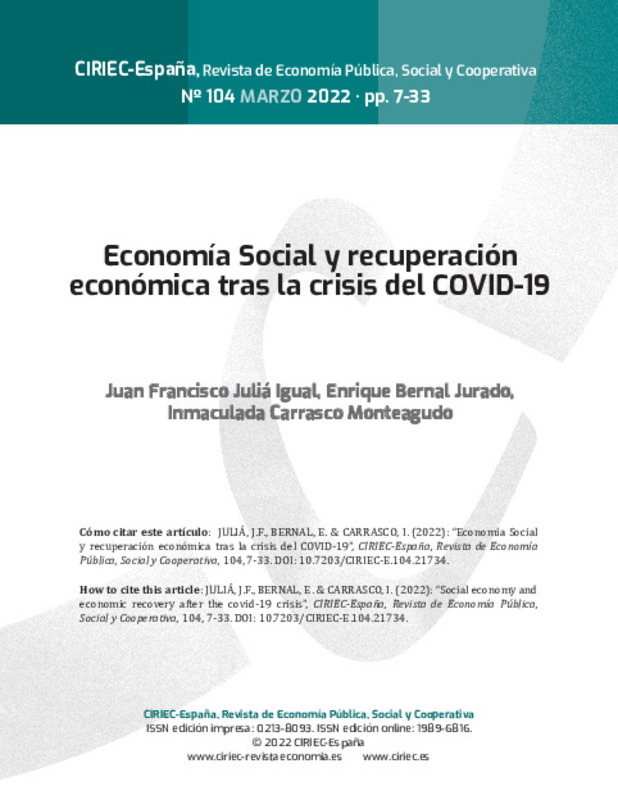JavaScript is disabled for your browser. Some features of this site may not work without it.
Buscar en RiuNet
Listar
Mi cuenta
Estadísticas
Ayuda RiuNet
Admin. UPV
Economía Social y recuperación económica tras la crisis del COVID-19
Mostrar el registro sencillo del ítem
Ficheros en el ítem
| dc.contributor.author | Julia-Igual, Juan
|
es_ES |
| dc.contributor.author | Bernal, Enrique
|
es_ES |
| dc.contributor.author | Carrasco, Inmaculada
|
es_ES |
| dc.date.accessioned | 2023-09-22T18:01:46Z | |
| dc.date.available | 2023-09-22T18:01:46Z | |
| dc.date.issued | 2022-03-31 | es_ES |
| dc.identifier.issn | 0213-8093 | es_ES |
| dc.identifier.uri | http://hdl.handle.net/10251/196976 | |
| dc.description.abstract | [EN] The crisis derived from the covid-19 pandemic has highlighted the need to im prove and review our model of economy and society. It has been evidenced the importance of giving greater relevance to science, the use of knowledge, and the incorporation of values related to sustainability and solidarity. Based on the financial resources provided by the Euro pean Union, the member states have designed plans aimed at overcoming the health, economic and social crisis as well as the previous existing imbalances. In this context, and considering a country like Spain, with a business structure character ized by the small business size, the involvement of Social Economy entities could be a guar antee for the good use of the European funding deployed, due to the resilience generated by the network of mutual support and the ability to promote collective projects that combine the economic with the social, favoring the development of spaces. But, in this case, it seems that the weaknesses of many Social Economy entities, related to their small size, have been able to play against the sector. With the caution due to the data pro visionality, it can be said that the pandemic has also truncated the growth trend in the business size of the sector. Of the different families of the Social Economy, and compared with the whole of the Spanish productive fabric, cooperatives have been the companies that have resisted the best, both in the number of companies and in employment, and labor societies the worst. KEYWORDS: COVID-19, recuperation, Social Economy, Next Generation | es_ES |
| dc.language | Español | es_ES |
| dc.publisher | Universitat de Valencia | es_ES |
| dc.relation.ispartof | CIRIEC-España revista de economía pública social y cooperativa | es_ES |
| dc.rights | Reserva de todos los derechos | es_ES |
| dc.subject | Economía social | es_ES |
| dc.subject | Crisis | es_ES |
| dc.subject | Covid | es_ES |
| dc.subject.classification | ECONOMIA, SOCIOLOGIA Y POLITICA AGRARIA | es_ES |
| dc.title | Economía Social y recuperación económica tras la crisis del COVID-19 | es_ES |
| dc.type | Artículo | es_ES |
| dc.identifier.doi | 10.7203/CIRIEC-E.104.21734 | es_ES |
| dc.rights.accessRights | Abierto | es_ES |
| dc.contributor.affiliation | Universitat Politècnica de València. Escuela Técnica Superior de Ingeniería Agronómica y del Medio Natural - Escola Tècnica Superior d'Enginyeria Agronòmica i del Medi Natural | es_ES |
| dc.description.bibliographicCitation | Julia-Igual, J.; Bernal, E.; Carrasco, I. (2022). Economía Social y recuperación económica tras la crisis del COVID-19. CIRIEC-España revista de economía pública social y cooperativa. 104:7-33. https://doi.org/10.7203/CIRIEC-E.104.21734 | es_ES |
| dc.description.accrualMethod | S | es_ES |
| dc.relation.publisherversion | https:doi.org/10.7203/CIRIEC-E.104.21734 | es_ES |
| dc.description.upvformatpinicio | 7 | es_ES |
| dc.description.upvformatpfin | 33 | es_ES |
| dc.type.version | info:eu-repo/semantics/publishedVersion | es_ES |
| dc.description.volume | 104 | es_ES |
| dc.relation.pasarela | S\460846 | es_ES |
| dc.subject.ods | 08.- Fomentar el crecimiento económico sostenido, inclusivo y sostenible, el empleo pleno y productivo, y el trabajo decente para todos | es_ES |








